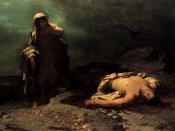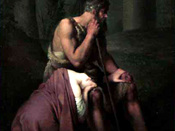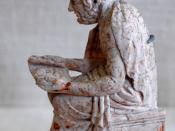In the play Antigone by Sophocles, Antigone chooses to abide by the laws of the Gods rather than the precepts of the mortals. Although Antigone's actions were rash and often disputable, she does the right thing by deciding to follow her individual conscience rather than obeying the laws of the state. Her decision to go against Creon's decree in order to bury Polyneices leads to many unfortunate consequences. Although she is faced with death, imprisonment, and suicide, Antigone is not regretful. Her decision is not only conscientious and virtuous but it also respects the gods.
Antigone chooses to bury her brother out of respect for the law of the gods even if it means disobeying her uncle, King Creon. "I am not afraid of the danger; if it means death, it will not be the worst of deaths "" death without honor (Sophocles, p. 193),"� Antigone will sacrifice anything to bury Polyneices because in her opinion, death without honor is worse than death.
"It was not God's proclamation. That final Justice that rules the world below makes no such laws (Sophocles, p. 208),"� her justification for her deed is that the edicts of the gods outweigh the ones of the mortals. She states her reason for her actions and enunciates her beliefs that individual conscience precedes the state.
Burying Polyneices proves to be Antigone's destruction. Outraged with the dishonor for his kingdom and his decree, Creon chooses demise as Antigone's fate. "This death of mine is of no importance, but if I had left my brother lying in death unburied, I should have suffered. Now I do not (Sophocles, p. 208)."� Regardless of the fact that Antigone receives a death sentence, she is not remorseful. "There is no guilt in reverence for the dead (Sophocles, p. 210),"� Antigone argues against Creon stating that her punishment is not an ethical deed because she acted out of respect for the dead. Her death sentence is later changed to imprisonment in a stone vault. Antigone sees no way out of her tomb so she takes her life by hanging herself.
Antigone is noble in burying Polyneices. The action shows her volition in following through with her obligations to her gods. "What things I suffer, and at what men's hands, because I would not transgress the laws of heaven (Sophocles, p. 228),"� her deed was acted out of piety and therefore it is condoning. "No pride on earth is free of the curse of heaven (Sophocles, p. 215),"� Antigone is aware of the fact that gods are more powerful than man unlike Creon who is blinded by stubbornness as well as excessive pride and ignorant of the powers of the gods.
Antigone's decision is a virtuous one that was enacted out of piety. She views death as an unavoidable fate and sees the dead as more demanding than the live. Her belief is that death is not as dire as dishonorable death. She proves to be "a loyal friend indeed (Sophocles, p.194)"� even according to ones that oppose her. Only such a person is willing to sacrifice his/her life in order to comply with the laws of the gods. Antigone is not only a moral person but a tragic hero as well.





